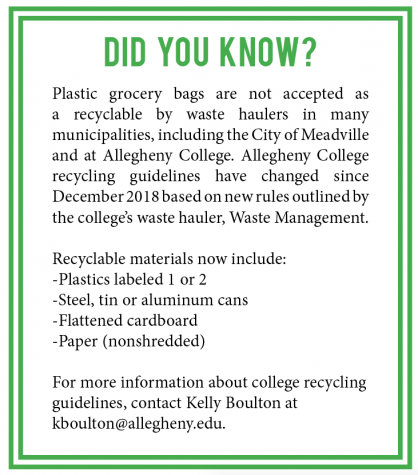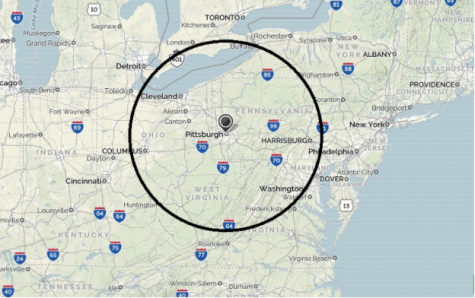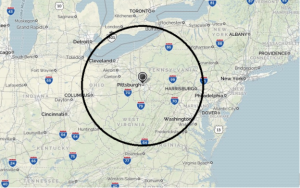Campus recycling shifts with global markets
Waste Management limits plastic collection, eliminates glass collection
As winter greets us with gifts of snow and ice, and the campus community seeks warmth and refreshment in Allegheny dining halls, change is upon us.
Recycling guidelines, outlined by the college’s trash and recycling hauler, Waste Management, now prohibit the recycling of glass and plastics labeled 3‒7 as of December 2018.
“People want to do the right thing when it comes to recycling, so there are questions, and we have to make sure that we’re talking through it with everyone,” said Kelly Boulton, ’02, Allegheny College’s sustainability coordinator.
Plastic materials labeled 1 or 2, metal and paper will still be accepted by Waste Management, however, Boulton clarified, shredded paper will no longer be accepted.
The changes were announced via a Dec. 16 My Allegheny post, which reads in part, “While we like to think recycling is a virtuous, environmental act, the reality is it’s an imperfect process driven by market economics rather than environmental ethos.”
Campus compost, which is managed by the college, as well as Waste Management trash guidelines have not changed. Food waste and Parkhurst Dining Services packaging are still compostable, and receipts and non-Parkhurst packaging belong in bins marked for trash.
Allegheny began contracting Waste Management for trash and recycling hauling in June 2016 after its contract with Tri-County Industries ended that year. Boulton said campus houses on Meadville city streets still follow the guidelines of Tri-County Industries, the city’s waste hauler.
Global recycling markets have been shifting for more than a year, according to Boulton, who said Waste Management notified the college of the changes a few days before the My Allegheny post announced them to the campus community.
In 2017, the People’s Republic of China submitted two separate notifications to the World Trade Organization outlining new guidelines for its intake of global recyclables.
In July 2017, China’s Ministry of Environmental Protection submitted an official notification to the WTO stating it would no longer import certain types of solid waste, including some plastics, unsorted paper and vanadium slag, a waste product of metal alloy production.
“We found that large amounts of dirty wastes or even hazardous wastes are mixed in the solid waste that can be used as raw materials,” the July 2017 notification reads in part. “This polluted China’s environment seriously. To protect China’s environmental interests and people’s health, we urgently adjust the imported solid wastes list, and forbid the import of solid wastes that are highly polluted.”
A November 2017 notification submitted to the WTO by China’s Standardization Administration described plans to decrease the level of contaminants allowed in imported recyclables. Contamination refers to any non-recyclable product or material being discarded among recyclables.
Contamination standards for recycling industries typically range between 1 and 5 percent, according to a Jan. 21 Washington Post article.
“Many Americans now have access to single-stream recycling, which spares them the trouble of sorting and separating plastics, paper, glass and metal,” the Washington Post reports. “But single-stream recycling has created headaches for Chinese processors. Even after sorting at a U.S. recycling facility, a plastic container might make it into a shipment of tin cans. Glass breaks, and shards are mixed in with pieces of paper.”
Based on its November 2017 notification, China’s new contamination standard for an acceptable amount of contamination among recyclables is 0.5 percent, a standard that took effect March 1, 2018.
These global market changes have impacted local recycling operations — here at the college, in Crawford County with the closure of its blue bin program in 2017 and in Erie County with the phasing out of glass, plastic bag and shredded paper collection across Erie County municipalities.
Boulton explained possible reasons glass recycling guidelines have shifted. Two significant factors, according to Boulton, are cost of glass transport and challenges in the recycling process. The weight of glass recyclables, relative to plastics and metals, makes shipment of glass materials more expensive.
The melting of glass occurs at higher temperatures than the melting of plastics, thus requiring more energy in the process. Boulton also said glass placed in recycling bins is often separated from other recyclables and crushed to be used as a barrier between layers of waste in landfills.

Adjusting to Waste Management’s new guidelines, Boulton said, mostly involves updating signage across campus, especially in McKinley’s Food Court and the Henderson Campus Center where several waste stations offer recycling bins.
As the sustainability coordinator, Boulton is responsible for other campus initiatives, inventories, research and programs, especially in the first few months of each calendar year when national sustainability organizations expect reports to be filed, and she said the recycling signage adjustments will hopefully be made within the next few weeks.
Boulton has been working on the college’s greenhouse gas inventory update and said Allegheny is more than halfway to its 2020 carbon neutrality goal set in 2010 as part of the U.S. Department of Energy’s Better Buildings Challenge.
“We still heat with natural gas, we still travel to conferences, we still study abroad,” Boulton said. “There’s a lot of emissions that will continue, so what we are working on now is developing a carbon offset portfolio.”
Compiling a carbon offset portfolio, Boulton explained, means finding ways to reduce emissions elsewhere in the world to compensate for emissions, like conference travel or study abroad, that cannot be feasibly reduced at Allegheny.
Boulton works with students to research offset options and maintain sustainability projects and initiatives, including the annual October Energy Challenge. Boulton also connects with Allegheny Student Government and Cat Lord, ’20, ASG director of sustainability and environmental affairs, who emphasized the importance of sustainable actions, even when environmental issues, like recycling processes and shifts, seem too overwhelming to tackle.
“We’re told pretty often that what we do on a personal level doesn’t matter anymore, but in reality it does because if we all stopped doing all these little everyday things to better the environment, things would still get worse,” Lord said. “Even if your small actions aren’t quite validated on a big scale, they’re still important.”
Campus recycling shifts will be reflected in the signage changes, but Boulton said she hopes the shifts also inspire the college community to think about our collective waste.
“Recycling is an act of sustainability, but as a stand alone, it is not sufficient,” Boulton said. “We have to re-educate people on what they can recycle, but I think this is also a moment for us to step back and say, why are we relying so much on this?”
Ellis Giacomelli is a senior majoring in environmental science and minoring in journalism in the public interest. She serves The Campus as a features editor...








